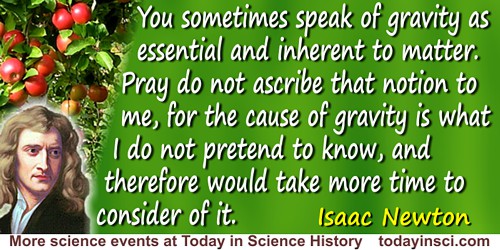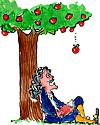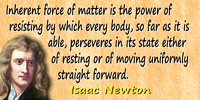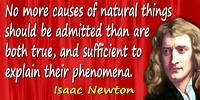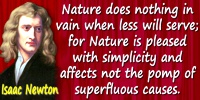 (source)
(source)
|
Sir Isaac Newton
(25 Dec 1642 - 20 Mar 1727)
English physicist and mathematician who made seminal discoveries in several areas of science, and was the leading scientist of his era.
|
Isaac Newton
“The cause of gravity is what I do not pretend to know”
Illustrated Quote - Medium (500 x 250 px)
More Isaac Newton quotes on science >>
This quote is from Newton’s correspondence with theologian Richard Bentley, who in 1692 delivered a series of sermons on the subject of “A Confutation of Atheism from the Origin and Frame of the World” at St. Martin-in-the-Field. This course of lectures was the first on the evidence of Christianity established by a bequest from Robert Boyle.
In preparing his sermons, Bentley had received Newton’s recommendations, in July 1691, for background information from parts of the Principia which had been published about five years earlier. After Bentley gave his oral presentations, but before publishing them, he consulted with Isaac Newton in several letters, clarifying a number of points regarding gravity and cosmogony, so that he could be sure the printed version of his lectures gave a correct interpretation of Newton’s ideas.
In Newton’s first reply (10 Dec 1692), he made his deep religious belief clear in his opening:
“When I wrote my treatise about our Systeme I had an eye upon such Principles as might work with considering men for the beleife of a Deity & nothing can rejoyce me more then to find it usefull for that purpose But if I have done the publick any service this way 'tis due to nothing but industry & a patient thought.”
Later in that same letter, Newton referred to the planets and their moons (the secondary planets):
“To your second Query I answer that the motions which the Planets now have could not spring from any naturall cause alone but were imprest by an intelligent Agent … its plaine that there is no naturall cause which could determin all the Planets both primary & secondary to move the same way & in the same plane without any considerable variation. This must have been the effect of Counsel.”
Bentley may have sent copies of the oral lectures to Newton (of which only one letter from Bentley survives). In one of these lost letters, it seems Newton felt his own views on gravity were somewhat misrepresented, so at the end of his second letter (17 January 1692/3) to Bentley about the lectures, Newton makes clear that he denies knowing gravity's cause:
“You sometimes speak of gravity as essential & inherent to matter: pray do not ascribe that notion to me, for ye cause of gravity is what I do not pretend to know, & therefore would take more time to consider of it.”
Within his fourth reply to Bentley, Newton included more on his view of gravity, in which he uses the word “immaterial” in the sense of being spiritual, rather than physical (material):
“Gravity must be caused by an agent [acting] consta[ntl]y according to certain laws, but whether this agent be material or immaterial is a question I have left to the consideration of my readers.”
The chronology of events (omitting mention of those letters of Bentley's that are not extant) is as follows.
November, 1692: Bentley delivers some version of what is later published as his 7th Lecture.
December 5, 1692: Bentley delivers some version of what is later published as his 8th Lecture.
December 10, 1692: Newton's first letter to Bentley.
January 17, 1692/3: Newton's second letter to Bentley, asserting that gravity is not essential to matter.
February 11, 1692/3: Newton's third letter to Bentley.
February 18, 1692/3: Bentley's letter to Newton, containing an “abstract and thread” of his then-unpublished Seventh Boyle Lecture.
February 25, 1692/3: Newton's fourth letter to Bentley, containing his remarks about matter acting without mediation.
1693: The published versions of Bentley's lectures appear.
1756: Newton's letters to Bentley are first published, as Four Letters from Sir Isaac Newton to Doctor Bentley.
- Science Quotes by Sir Isaac Newton.
- 25 Dec - short biography, births, deaths and events on date of Newton's birth.
- Isaac Newton - biography from Famous Men of Science (1889)
- Isaac Newton - Comments on his “Playing on the Seashore” Quote
- Isaac Newton - “Playing on the Seashore” illustrated quote - Medium 500px.
- Isaac Newton - “Playing on the Seashore” illustrated quote - Large 800px.
- Isaac Newton - context of quote “A change in motion” - Medium image (500 x 250 px)
- Isaac Newton - context of quote “A change in motion” - Large image (800 x 400 px)
- Isaac Newton - context of quote “In experimental philosophy” - Medium image (500 x 250 px)
- Isaac Newton - context of quote “In experimental philosophy” - Large image (800 x 400 px)
- Isaac Newton - context of quote “Standing on the shoulders of giants” - Medium image (500 x 250 px)
- Isaac Newton - context of quote “Standing on the shoulders of giants” - Large image (800 x 400 px)
- Isaac Newton - context of quote “Impressed force is the action” - Medium image (500 x 250 px)
- Isaac Newton - context of quote “Impressed force is the action” - Large image (800 x 400 px)
- Isaac Newton - context of quote “Inherent force of matter is the power of resisting…” - Medium image (500 x 250 px)
- Isaac Newton - context of quote “Inherent force of matter is the power of resisting…” - Large image (800 x 400 px)
- Isaac Newton - context of quote “Plato is my friend” - Medium image (500 x 250 px)
- Isaac Newton - context of quote “Plato is my friend” - Large image (800 x 400 px)
- Isaac Newton - context of quote “Colours which appear through the Prism ” - Medium image (500 x 250 px)
- Isaac Newton - context of quote “Colours which appear through the Prism ” - Large image (800 x 400 px)
- Isaac Newton - context of quote “Nature does nothing in vain” - Medium image (500 x 250 px)
- Isaac Newton - context of quote “Nature does nothing in vain” - Large image (800 x 400 px)
- Isaac Newton - context of quote “No more causes of natural things should be admitted” - Medium image (500 x 250 px)
- Isaac Newton - context of quote “No more causes of natural things should be admitted” - Large image (800 x 400 px)
- Isaac Newton - context of quote “Truth is ever to be found in simplicity” - Medium image (500 x 250 px)
- Isaac Newton - context of quote “Truth is ever to be found in simplicity” - Large image (800 x 400 px)
- Isaac Newton - context of quote “Every body perseveres in its state of being at rest” - Medium image (500 x 250 px)
- Isaac Newton - context of quote “Every body perseveres in its state of being at rest” - Large image (800 x 400 px)
- Isaac Newton - context of quote “God, in the beginning, formed matter” - Medium image (500 x 250 px)
- Isaac Newton - context of quote “God, in the beginning, formed matter” - Large image (800 x 400 px)
- Isaac Newton - context of quote “The cause of gravity is what I do not pretend to know” - Large image (800 x 400 px)
- Sir Isaac Newton’s Apple-Tree - debunking the myth, from Historic Ninepins: A Book of Curiosities by John Timbs (1869)
- Newton and the Dog - debunking the myth about Newton’s dog Diamond.
- Booklist for Isaac Newton.
